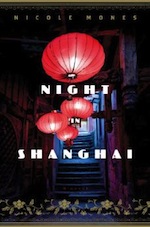
Nicole Mones
Night in Shanghai
(Houghton Mifflin Harcourt, March 2014)
Sailing to Shanghai in 1936 to lead a black jazz orchestra, Thomas Greene goes from being flat broke in segregated Baltimore to living in a mansion with servants of his own, and from the classical piano pieces he was trained to play to the toe-tapping swing of the big band era.
Song Yuhua is refined, educated, and bonded since age eighteen to Shanghai’s most powerful crime boss in payment for her father’s gambling debts. Outwardly submissive, she burns with rage, longs for escape, and risks her life spying on her master for the Communist Party.
With Shanghai shattered by the Japanese invasion, Thomas and Song find their way to each other and forge a bond from which neither can back down in the turbulent years that follow. Torn between music and survival, freedom and commitment, love and war, they navigate the dangers leading to world war until the moment when they must cast their lots in Night in Shanghai’s final, impossible choice.
Praise for Night in Shanghai
“In the early 1930s, as the world teeters on the brink of war, struggling musician Thomas Greene leaves the South’s racial prejudices behind when he accepts an offer from a Chinese nightclub owner to headline a jazz band in Shanghai. Though the classically trained pianist is uncomfortable with this new style of music, he is ecstatic to be free of the Jim Crow laws that have impeded his success at home. As Greene embraces the relative freedom that life in this cosmopolitan city affords, he becomes increasingly embroiled in both the criminal and Communist underworlds that are threatened by the imminent Japanese invasion. Through his love for party sympathizer Song Yuhua and friendship with protector of Jews Lin Ming, Greene finds himself at the epicenter of world-shattering events. Based on true episodes and peppered with the lives and experiences of actual characters from the worlds of politics, music, the military, and the government, Mones’ engrossing historical novel illuminates the danger, depravity, and drama of this dark period with brave authenticity.”
—Booklist, STARRED REVIEW
“Both of them young and awkward, but gifted and smart, (Thomas and Song) make for an odd but brilliant pair of lovers. They light up the pages of this novel … Night in Shanghai, an intelligent historical romance, shows off with forceful insight, terrific characters and a telling sense of detail. And, folks, it swings.”
—Alan Cheuse, All Things Considered, NPR
“Amid the plethora of World War II fiction, Mones’s fourth novel (after The Last Chinese Chef) offers a rarely seen African American and Asian perspective. Fans of works such as Amor Towles’s Rules of Civility will appreciate the use of jazz as the backdrop to a world at war. Historical fiction fans will not be disappointed.”
—Library Journal
“A lot of talented jazz musicians in the 1930s couldn’t buy a drink in the places they played. They were African-American musicians who created the music of their times but still had to live under the sting of segregation…. Thomas Greene is recruited to play jazz…in a new place. Not Harlem, or the South Side of Chicago, or even Paris, but Shanghai. He finds success but then World War II begins to grip Shanghai and the world….by the time the novel ends, lives have been, to say the least, shaken, stirred, turned upside down.”
—Scott Simon, NPR
“Nicole Mones conjures up the jazz-filled, complex, turbulent world of Shanghai just before World War II. A rich and thoroughly captivating read.”
—Gail Tsukiyama, author of The Samurai’s Garden
“What an incredible thing Mones does in this novel of the compelling, sexy, rich and complicated world of historical Shanghai. Every page reveals some custom, some costume, some food, some trick of language that exposes a fascinating moment in history — the Japanese invasion on the eve of World War II. Mones weaves the multiple strands of her story much the way themes and melodies are woven into the jazz her protagonist plays, with subtle and suggestive undertones of human greed, power, and passion.”
—Marisa Silver, author of Mary Coin
“Real-life historical figures and fictional characters are cleverly intertwined in this gripping story, set in Shanghai in the 1930s and early 40s. The linchpin is the relationship between African-American jazz musician Thomas Greene and the lovely Song Yuhua, a Communist Party spy who is bonded to the city’s most powerful crime boss. Shanghai’s seedy underbelly is exposed, and woven into the toe-tapping swing of the big-band era and the role of prominent Chinese politicians. Some of its most powerful moments are documented in the stories of the city’s Jewish refugees, and in the aftermath of the Japanese invasion of Shanghai.”
—The West Australian
Nicole Mones is the award-winning author of The Last Chinese Chef, Lost in Translation, and A Cup of Light. She won the World Gourmand Cookbook Award and the Kafka Prize. Nicole is a member of the National Committee on U.S.-China Relations.
